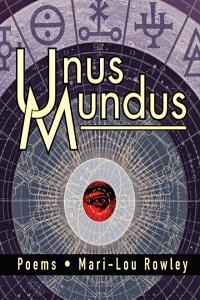Mari-Lou Rowley. Unus Mundus. Vancouver: Anvil Press, 2013.
~Reviewed by Alexis Motuz
In Unus Mundus, Mari-Lou Rowley celebrates the underlying unity of the universe and draws our attention to relationships between the material, psychic, and spiritual realms. Composed of six sections, her collection opens with “Prologue . . . In the Beginning,” which reviews history and points to a time before scientific discoveries, inventions, religious belief, and myth had constructed our current Western rationalist worldview. Rowley’s list-poem progresses from naming abstract philosophical perspectives––“[b]efore time was the centre of things,” “[b]efore the Anthropic Cosmological Principle––to exposing their concrete effects. In the second half of ”Prologue,” she refers nostalgically to a time “[b]efore cows and fish ate rendered flesh / . . . / Before trains, and suitcases and gas chambers,” “[b]efore napalm and nuclear arms . . . radiation therapy and breast implants.” The final line, “[b]efore another day goes by,” shifts the tone from lament to a call to construct an alternative future. By pausing to reflect on how such atrocities might continue to add up if we do not change our worldview, Rowley sets up the urgency of her own re-vision of the cosmos in the five sections of the book that follow.
Rowley’s second section, “Space/Time Dialogues,” collapses time to position philosophers such as Plato and Ptolemy in fruitful conversation with twentieth-century figures from Einstein and Van Gogh to Roy Orbison and TuPac. In “Cosmosonnets,” Rowley then shifts her focus from time to space as she uses scientific theories about matter on cosmic, macro-, and micro-scales to describe human experience. “Supernovae,” for example, describes the lifecycle of a “red giant” and connects it implicitly with a man’s experience of middle-age:
Overblown, burnt out, way beyond prime
he hangs out in the Super Bowl, watching
the universe recede. A suicidal supernova’s
last gasp for greatness, yearning to go down
in time, rival the brightness of galaxies,
be something else.
Rowley has a gift for mining the metaphors provided by science while steadfastly adhering to the particulars of scientific theories. A little background research reveals that the red giant is a middle-aged star that, having used up all of the hydrogen at its core, is literally “burnt out.” In its degeneration, it gives off a final flash of light that “rival[s] the brightness of galaxies,” before it “spews / fragments of matter, solar systems, humans” and finally transforms into “something else.” Rowley repeatedly astonishes with her ability to incorporate science and the vocabulary of science into her poetry all while remaining attuned to the musicality of the language: lovemaking, for instance, is “[p]article energy measured in electron volts, / the untidy oblate geometry of love” and, in a later section, a fish is described as a “voracious gleaming / skin slick / and sinking fast.”
“Strange Terrains,” “Animalus,” and “Feral Verse,” which complete her collection, continue to surprise readers with a freshness of perspective, imagination, irony, and engaged cultural critique. Unus Mundus was runner-up for the John V. Hicks Long Manuscript Award and is a likely candidate for further nomination. Rowley’s ninth collection is ambitious and sophisticated, and a must-read for anyone interested in science poetry, ecocriticism, or who wants to a fresh vision of the unity underlying our ‘one world.’
Alexis Motuz is a PhD student in English and Film Studies at Wilfrid Laurier University in Waterloo, ON. She is currently researching representations of the land in Canadian women’s poetry.
Arc: the luminous bridge formed between two thoughts.


